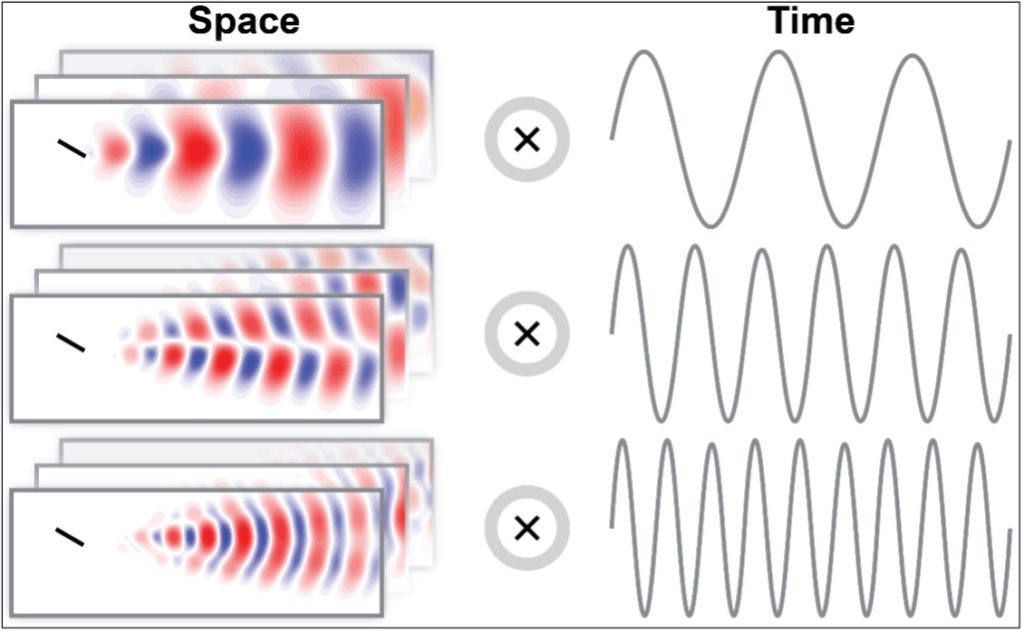Jet engines and wind turbines emit excessive noise. Climate change gives rise to catastrophic phenomena that are difficult to anticipate. How does a person’s sneezing breath spread diseases like influenza? These are issues that can be addressed by effective modeling of turbulent flows.
Turbulent flows are fluid motions characterized by chaotic changes in pressure and flow velocity, and they are ubiquitous in science, engineering, and in our world. Their wide range of spatial and temporal scales, however, make them difficult to model and expensive to simulate. A simulation via supercomputer, for example, may consume some 100,000 core-hours, emitting an estimated 0.9 metric tonnes of CO2 into the atmosphere (comparable to the carbon emissions from driving an average passenger car from New York to Los Angeles), and some simulations can even be far larger, emitting up to several thousand metric tonnes of CO2. Yet, tens or hundreds of these simulations might be required to explore a parameter space or to solve an optimization problem.

Reduced-order models (ROMs) provide an alternative to these costly simulations. These simplified mathematical models have the potential to reduce simulation costs and, in some cases, eliminate the need for supercomputers. To accelerate scientific discovery, engineering design, and control of turbulent flows, these more accessible tools are urgently needed.
Aaron Towne, Assistant Professor of Mechanical Engineering, has won a 2022 NSF CAREER Award for his proposal, “Scale-dependent reduced-order models for turbulent flows,” which seeks to address society’s need for cheaper, more accessible turbulent flow modeling by developing a pair of new mathematical models tailored for long- and short-time prediction of turbulent flows.

The new models seek to overcome long-standing limitations of previous methods by working within a nascent space-time modeling framework. By strategically selecting how the solution is allowed to evolve in time, Dr. Towne’s proposed approach respects the physical relationship between spatial and temporal scales of the flow, which is critical to properly capture physical processes that are essential to turbulence.
High-fidelity simulations are unquestionably important for scientific discovery and engineering analysis. While they will likely play an indispensable role in advancing scientific and engineering innovations, reducing their number by replacing some subset of them with accurate ROMs will accelerate discovery and reduce the environmental impact of fluid dynamics research. Dr. Towne’s project will constitute an important step forward by providing just such ROMs for turbulent flows, a class of problems for which they are most urgently needed. The new tools will be applicable to a wide range of turbulent flows and usable by researchers in academia, government labs, and industry to address issues like adverse health effects from excessive noise emissions and to better predict climate change by more effective modeling of geological flows. To accelerate and streamline their adoption, the methods developed during this project will be incorporated into the open-source platform Pressio, a software framework maintained by Sandia National Laboratory.
Dr. Towne’s research program is also closely integrated with a comprehensive educational outreach program, the central component of which is a series of professionally produced videos. Each video will spotlight a key contributor to the field of fluid dynamics and their work to address issues relevant to the public good. By promoting each scientist not only for their work, but for their unique perspectives and values, these accessible, engaging, and welcoming videos will help empower students from underrepresented communities to envision themselves as future scientists. They will foster interest in STEM (and especially in fluid dynamics) and promote work that is critical to addressing the big problems facing our society today.
When asked how he felt, receiving this recognition, Dr. Towne said, “It’s exciting! I view this CAREER award as confirmation from leaders in my field that my research is headed in a promising direction. ”
Congratulations, Dr. Towne.
“The Faculty Early Career Development (CAREER) Program is a Foundation-wide activity that offers the National Science Foundation’s most prestigious awards in support of early-career faculty who have the potential to serve as academic role models in research and education and to lead advances in the mission of their department or organization.”
